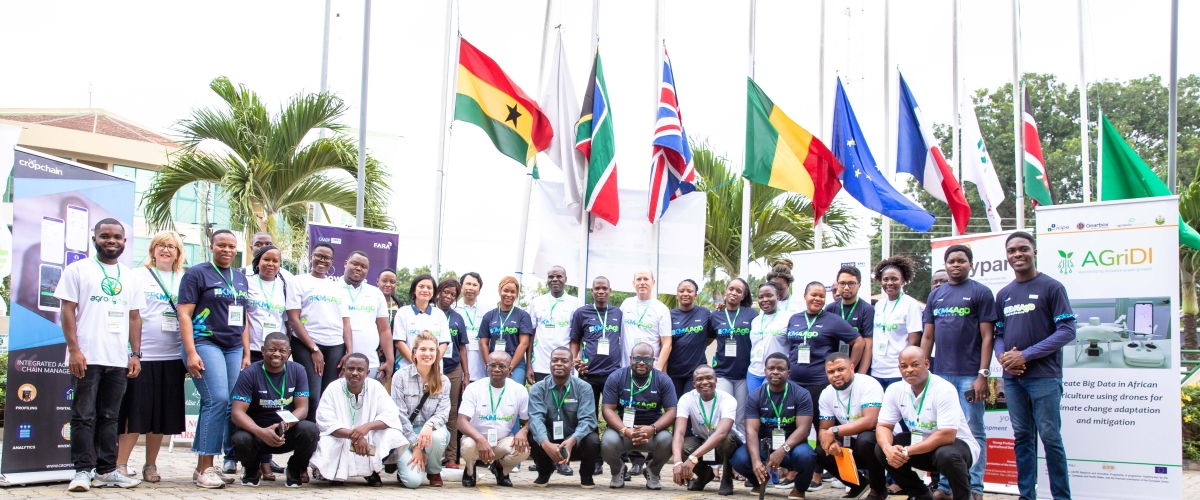
The CAADP-XP4 Consortium, with financial support from the European Union through the implementation of the International Fund for Agricultural Development (IFAD), jointly held a Knowledge Management for Agricultural Development (KM4AgD) Challenge & Conference from 14th to 16th September 2022 at Alisa Hotel, in Accra, Ghana. The Consortium comprise the African Forum for Agricultural Advisory Services (AFAAS), Association for Strengthening Agricultural Research in East and Central Africa (ASARECA), West and Central African Council for Agricultural Research and Development (CORAF) and Forum for Agricultural Research in Africa (FARA). The technical support came from the Knowledge for Development Partnership (K4DP). The conference was hosted by FARA.
The conference-themed Strengthening the African Knowledge Ecosystem for achieving & Sustaining the CAADP Malabo targets 2025 attracted researchers, Academia, media practitioners, communication officers and information officers from 19 African countries. The primary objective of the Continental Conference was to wrap up the 2022 edition of the KM4AgD Challenge.
The KM4AgD Challenge is an initiative aimed at boosting knowledge-based development in AR4D in Africa by developing a community of practice of knowledge management practitioners across the country. It takes place annually with a growing number of countries participating. The climax for each annual Challenge is a KM Conference (hybrid) where participants present their results and receive certificates as “AR4D KM Agents for Sustainable Development”.
This was the second conference, and the first having occurred last year in 2021, where 30 participants from 28 countries completed the Challenge and were certified Knowledge Managers. This year, the KM4AgD Challenge started in June and ran for three months. During this period, 28 participants from 19 countries developed Knowledge management strategies for their respective institutions, and they also took part in one of the five challenges, which included the following :
- African Union Commission (AUC), CAADP-XP4 and CGIAR Knowledge Management Framework For Agricultural Research Development in Africa,
- Advanced Knowledge Processes; Traditional Knowledge and Fake News,
- Knowledge Inclusion: Gender and Disabled Rural dwellers?
- Knowledge Partnerships and Resource Mobilisation
- Knowledge hub and Digitization for Agricultural Advisory and outreach.
During the conference, participants from AFAAS, ASARECA, CCARDESA, and CORAF regions were allowed to present their draft country’s/organization’s draft KM strategies and briefs for validation. Following the 3 months of course-work done on-line with instructions from renowned KP experts, the participants were awarded certificates as “Certified Knowledge Agent for Sustainable Development” to reward their efforts. They were also inducted as Fellows of the Africa KM4AgD Community of Practice for Artificial Intelligence and Centre of Excellence for KM and network with the wider KM Global Community.
During the Conference, Prof. Andreas Brandner from the Knowledge for Development Partnership (K4DP) pointed the participants to the time when Jesus fed 5000 as an act that showed that he put love at the centre of what he did and shared the food with the 5000 people. Likewise, Prof Andreas urged the KM4AgD Challenge participants to spread the Knowledge management message far and wide so that it becomes a wildfire that cannot be quenched as sharing is caring.
Mr Benjamin Abugri, the FARA Lead KM specialist and host of the event, reiterated that the KM4AgD is a lighthouse initiative and that KM is not an environment for competition but for innovation.
Dr Sarah Cummings (Director at K4DP and Lecturer, Wageningen University, presented on Advancing knowledge diversity and inclusion; promoting indigenous knowledge and decolonizing knowledge. She further advanced the epistemic injustice view of knowledge.
Mr Ben Ilakut, ASARECA knowledge management and communication lead, shared the overview of the organization’s agenda.
Mr Andri Raso from AFAAS shared with the participants his organization strategy and emphasized the need to deliberately get the knowledge to the last mile so that they are making information-based decisions.
Mrs Bridget Kakuwa-Kasongamulilo, CCARDESA ICKM officer, shared the CCARDESA knowledge management agenda and emphasized the need to ride on existing technologies such as the CCARDESA Mobile App to reach the last mile farmer through the extension.
Mr Michael Victor, head of knowledge management at ILRI, stressed the role of partnership in knowledge management for sustainable and effective impact among stakeholders.
Ms Peace Mutuwa, the AUC communication and Knowledge management officer, probed why there was no clear link between the knowledge management strategies and the regional and continental frameworks. She urged participants to see how their strategies could respond to meeting the national Malabo targets.
Other presenters came from Academia and the CGIAR network.
The certified managers were happy and looked forward to implementing the strategies as well as contribute to the growth of their organizations as they relate to knowledge management.
As can be seen, Knowledge is the missing link in sustainable agricultural development as it is essential for it supports critical decision-making and evidence-based planning. Knowledge is critical for research organizations because research is essential for generating knowledge. The role of AR&D institutions in knowledge generation is critical towards Africa’s agenda in halving poverty by 2025 through the CAADP Malabo commitment and contributing to the SDGs 2030. Therefore, ensuring that this knowledge reaches and benefits the end-users is very important.






